Books and Monographs
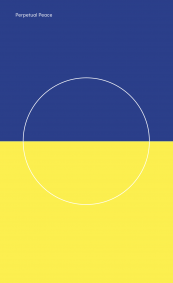
Perpetual Peace 2024
(March 2024)
With the wars in Ukraine and Gaza, we can no longer continue to see a state of peace as merely the temporary absence of war, since war now appears as the perpetual horizon of our world. Over two hundred years ago, Immanuel Kant first outlined six preliminary conditions for perpetual peace. As of today, none of these conditions have been achieved. With this in mind, the Perpetual Peace Project brings various disciplines and communities together to explore 21st century international priorities and prospects for reducing geopolitical conflict. Organized around Immanuel Kant’s foundational essay ‘Perpetual Peace: A Philosophical Sketch’ (1795), the project finds its publicity in a series of initiatives including international symposia, workshops, and this special edition that has been designed with your participation in mind. Kant’s original sketch takes the form of an international treaty exploring the possibility of permanent peace and anticipated multilateral and supranational institutions such as the original League of Nations, as well as today’s United Nations—one of the original partners in this project. In light of this legacy, the Perpetual Peace Project~2022 seeks to promote collaborations with leading theorists and practitioners in the universities, cultural institutions, governmental halls, and in the wider public sphere, without planning where these conversations lead.
PDF Download available from GreggLambert.com
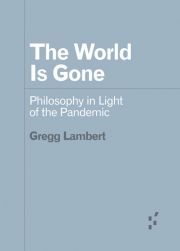 The World Is Gone
The World Is Gone
Philosophy in Light of the Pandemic
(University of Minnesota Press, February 2022)
Part personal memoir, part philosophical reflection and written in the midst of the pandemic in 2021, The World Is Gone employs the Robinson Crusoe fable to launch an existential investigation of the effects of extreme isolation, profound boredom, nightly insomnia, and the fear of madness associated with the loss of a world populated by others.
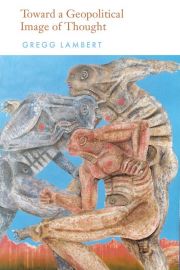
Towards a Geopolitical Image of Thought
(Edinburgh University Press, February 2021)
Drawing from his previous writings on the search for a new image of thought and the vitalist role of 'conceptual personae' in the history of philosophy, Gregg Lambert proposes a new geo-political image of thought that is uniquely commensurate with the globalisation of contemporary continental philosophy. Inspired by Deleuze and Guattari's concept of geo-philosophy and Jean-Francois Lyotard's archipelago of contemporary political reason, Lambert radically reorients the future direction of continental philosophy, no longer defined traditionally according to national and linguistic traditions and by the opposition with Anglo-American academic philosophy.
In this outstanding series of essays, at times analytical, expository and explanatory, Lambert explores Deleuze and Guattari’s conception of geo-philosophy in the broader context of contemporary analytical and continental approaches. He provides an exemplary series of analyses of the nature of commentary, the fragmentary nature of contemporary thought, and key Deleuzian concepts such as the Other, desiring-machines and territory. This book is a must read for anyone interested in thinking with Deleuze and Guattari, Derrida, Lyotard and the philosophical canon.
– Paul Patton, Hongyi Professor of Philosophy, Wuhan University
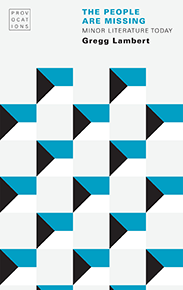
The People Are Missing Minor Literature Today
("Provocations," University of Nebraska Press March 2021)
“The people are missing” is a constant refrain in Gilles Deleuze and Félix Guattari’s writings after the 1975 publication of Kafka: Pour une litterature mineure. With the translation of this work into English (Kafka: Toward a Minor Literature) in 1986, the refrain quickly became a hallmark of political interpretation in the North American academy and was especially applied to the works of minorities and postcolonial writers. However, in the second cinema book, Cinéma-2: L’Image-temps, the refrain is restricted to only third-world cinema, in which Deleuze and Guattari locate the conditions of postwar political cinema: the absence, even the impossibility, of a people who would constitute its organic community.In this critical reflection, Gregg Lambert traces the “narrowing” of the refrain itself, as well as the premise that the act of art is capable of inventing the conditions of a “people” or a “nation,” and asks whether this results only in reducing the positive conditions of art and philosophy in the postmodern period. Lambert presents the most penetrating and systematic analysis to date of the famous Deleuzian concept of minor literature and the related notion of the missing people in the conjuncture of contemporary critical theory.
“Lambert’s book is mesmerizing. . . . Serious literary and political theorists will want to read this.”—Dorothea E. Olkowski, author of Postmodern Philosophy and the Scientific Turn
“The People Are Missing is a commanding intervention by one of the most original and incisive readers of Deleuze today. Lambert assuredly offers the reader what is undoubtedly the most penetrating and systematic analysis to date of this famous Deleuzian concept of ‘minor literature.’”—Nick Nesbitt, author of Caribbean Critique: Antillean Critical Theory from Toussaint to Glissant
Reviews:
As Kafka writes in “A Country Doctor,” “One doesn’t know the sorts of things one has stored in one’s own house.” This becomes an implicit refrain across Gregg Lambert’s The People Are Missing: Minor Literature Today, insofar as it applies to the current state of literary critical and aesthetic theory. Following several decades of Deleuze-inflected approaches in areas like affect theory, the new materialisms, posthumanism, postcolonialism, or indeed the legacy of the “Bartleby-machine,” the question is what would an inventory of conceptual resources in the house of Deleuzian theory now reveal? And what efficacy do its conceptual resources retain for thinking current problematics? Lambert’s trenchant answer focuses on the aesthetico-political question of what is a “minor literature today.” At the core of this question is a meditation on art’s seeming capacity to resist majoritarian dispositifs of power. What “revolutionary becomings” is literature—or art or cinema—still capable of effecting in the wake of the neoliberal retrenchments of global capitalism, and the mass commodification of the artwork and literary text? What possibilities remain for art to “invent a missing people”—a refrain at the center of a Deleuzian politics—and, in turn is there a difference between inventing an absent people and finding a missing one? Lastly, as if to defibrillate our moribund cultural scene, should we, as Lambert says with a tongue-in-cheek imperiousness, “kill the critics” and “close all the creative writing factories” (ix, 121)? —Michael Jonik, American Literary History
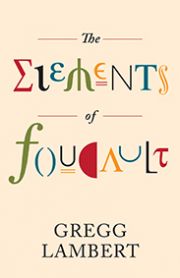
(University of Minnesota Press, 2020)
A new conceptual diagram of Foucault's original vision of the biopolitical order. The Elements of Foucault presents a critical study of Foucault's concept of method from the earlier History of Sexuality, Volume 1, to the last lectures on biopolitics and neoliberal governmentality. Lambert breaks down Foucault's post-1975 analysis of the idea of biopower into four elements: the method, the conceptual device (i.e. dispositif), the grid of intelligibility, and the notion of "milieu." Taken together, these elements comprise the diagram of Foucault's early analysis and the emergence of the neoliberal political economy. Lambert further delves into how Foucault's works have been used and mis-used over time, challenging the periodization of Foucault's later thought in Foucault scholarship as well as the major and most influential readings of Foucault by other contemporary philosophers—in particular Gilles Deleuze and Giorgio Agamben. The Elements of Foucault is the first generally accessible, yet rigorous and comprehensive, discussion from lectures and major published works of Foucault's post-1975 theory of biopower and the major innovation of the concept of dispositif. It is also the first critical work of its kind to address the important influence of French philosopher Georges Canghuilhem on Foucault's thought.
"In this provocative and highly original text, Gregg Lambert challenges the standard view that Michel Foucault’s works are discontinuous by showing that Foucault does not leave his past ideas behind, but rather incorporates them into new constellations as he confronts new problems. By introducing a fourth element—milieu—into Foucault’s analysis of biopower to supplement the elements of method, dispositif, and grid of intelligibility, Lambert’s self-described mutation of biopower will be required reading for any serious Foucault scholar."—Alan D. Schrift, author of Twentieth-Century French Philosophy: Key Themes and Thinkers
"Gregg Lambert's study of Michel Foucault's work from the formulation of the concept of discipline to the notion of biopower demonstrates the inadequacy of interpretations that offer either an evolutionary or devolutionary reading of its movement. He shows that, at every step, Foucault both retains and sets aside concepts elaborated in previous texts and does so in a purely provisional manner, subject to perpetual revision. Lambert takes us beyond the too obvious periodizations into which Foucault's work is so often divided and allows us to see the complexity and unevenness that give some of his most important contributions their singular power."—Warren Montag, Occidental College
Reviews:
Lambert’s book, by contrast, intervenes in the multiple ‘archaeological strata’ of scholarly commentaries on Foucault, and offers a different organisation of Foucault’s thought. Lambert reflects on the methodological reversal that grounds Foucault’s engagement with the subject of power by offering an analysis that remains fundamentally spatial: it addresses the question of how to redefine the space of power once we subtract the assumption of the centralised position of the sovereign as the focal point and pivot of any political theory of power. As Lambert explains, the problem that Foucault faces is primarily epistemological: it ensues from the rejection of the assumption underpinning a large part of the history of philosophy before him, namely the equation of power with the soul (Aristotle), substance (Spinoza), or subject (Hegel and Marx), and the notion that power can (and should) be rationalised in a general system of thinking.--Sara Raimondi, Contemp Polit Theory (2022). https://doi.org/10.1057/s41296-022-00549-6
Elegant and clearly argued, The Elements of Foucault unifies Foucault’s corpus, including his lectures at the Collège de France, through an original focus on method. Lambert (Syracuse Univ.) traces the experimental strategy in volume 1 of History of Sexuality (1978) to Descartes’s more geometrico, and shows how Foucault uses the dispositif, or demonstrative image of Euclidean geometry, to analyze power relations such as discipline, biopower, and neoliberalism, the axioms of which had hitherto been taken for granted, rather than proven, by political theorists. Lambert’s genealogy of the “machinic” metaphor augments prior discussions of the “apparatus” by Deleuze, Agamben, and particularly Georges Canguilhem, whose essay “Machine and Organism” probably influenced Foucault’s “non-mechanistic” adaptation of early modern European philosophy. Lambert’s account emerges from a plea for meditations rather than polemics around the transdisciplinary objects such as gender and race that have replaced academic disciplines without rendering “authors” (now understood as representing social location) any less central than before. Foucault’s lesson is that theories of power designed to combat one political situation may unwittingly spread and legitimate the power relations replacing it. This admirably concise text casts fresh light on the function of images and seemingly indispensable concepts in scholarly and popular controversy.
--
L. Hengehold, review of The Elements of Foucault, Choice, 11.17.20.
Professor Gregg Lambert, Dean’s Professor of Humanities in the College of Arts and Sciences at Syracuse University, brings to his study of Michel Foucault the needed philosophical depth to successfully contextualize Foucault’s later thought and writing. This is particularly the case of his post1975 lectures. Lambert, as a former student of Jacques Derrida, and through his recent studies of Gilles Deleuze, is in an excellent position to explicate as well as to compare transitional trends manifest in contemporary French and European criticism and philosophy.
—Theodore W. Eversole, Canadian Journal of History (spring-summer 2021)
https://doi.org/10.3138/cjh.56.1-br09
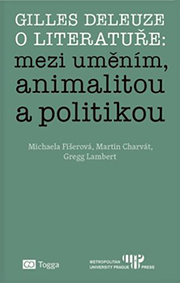
Gilles Deleuze o literatuře: mezi uměním, animalitou a politikou
(KNIHKUPECTVÍ KAROLINUM, 2019)
Lambert Gregg -Fišerová Michaela - Charvát Martin
Gilles Deleuze on Literature: Art, Animality, Politics. Prague: Togga/Metropolitan University Press. The goal of this collective monograph is to approach Deleuze's understanding of literature from three different thematic angles. In the first chaper, Martin Charvát proposes a new reading of Deleuze's and Guattari's book What is Philosophy?, which is well known for its ambition to distinguish three ways of assembling the chaos: philosophy, science and art. Deleuze and Guattari characterize the philosophy as a creation of concepts, the science as a creation of functions, the art as a creation of percepts and affects. This distinction could seem to be a reason for putting the art in a lower, supportive position. However, Charvát points out the contrary: Deleuze's differences between the areas of art and philosophy, which could seem to be intransigent, are permeable and pervade progressively. The following genealogic passage, which aims to explain the evolution of Deleuze's thinking on creativity in literature, is formulated by means of his concepts of literary machine and vision. As such, it helps to articulate Deleuze's conception of creativity in philosophy.
In the second chapter, Michaela Fišerová points out another aspect of Deleuze's approach to literature by emphasizing, on the one hand, the interconnection between politics and literature, on the other hand, the topic of animality, which belongs to the central interests of Deleuze's philosophy. Fišerová focuses mostly on the comparison of Deleuze's and Derrida's reading of Franz Kafka's "animal stories", by proceeding in three interconnected steps. Firstly, she evaluates the possible disadvantages of a scholarly exegetic reading and advantages of a philosophically inspiring reading. Secondly, in order to designate the different inspirations in their readings of Kafka's work, she compares the differences between Deleuze's and Derrida's philosophies and the possible limits of their readings. Thirdly, based on the previous comparison, she formulates a double ontological ethics of post-structuralism depending of double consideration of the problem of animality in Kafka's work: while Derrida deconstructs the problematic „becoming-animal“ of a human who already "is" an animal, Deleuze's concept of „becoming-animal“ indicates a connection between the line of animality and the Kafka's literary machine. In this respect, Fišerová wonders why do Derrida and Deleuze read Kafka's work with such a philosophical interest? She answers this question by pointing out the specificity of poststructuralist readings of literature, which enables to formulate an implicit philosophical problem. Finally, her reflection illustrates the Deleuze's idea that a book's sense remains only in its contact with exteriority.
In the third chapter, Gregg Lambert focuses on the importance of politics for Deleuze's reflection of literature. In order to emphasize the sense of the „minor literature“, Lambert proposes a new reading of Deleuze's a Guattari's specific appropriation of Kafka's work. Lambert wonders whether the minor literature, destined to the „missing people“, is present in the contemporary world. He asks whether Deleuze's topic of the "missing people" is just a melancholic refrain in the philosopher's cry over his own missing life, or whether it is an expression of his specific conception of the ethic of creation. It is this second way that Lambert's reflection follows: he emphasizes not only the ethic of creation as a political act, but he also deals with the question, how should a critic evaluate a work of art, which is composed to be a vision of „those to come“. In this sense, on the one hand, Lambert's chapter turns to the problematic of art elaborated in Martin Charvát's chapter, on the other hand, it joins the reading of Kafka proposed in Michaela Fišerová's chapter. Based on his new reading of Kafka's diaries, Lambert finally proclaims the ethical and political limitations of literature, which should be philosophically reformulated for the contemporary world.
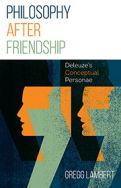
Philosophy After Friendship: Deleuze's Conceptual Personae
University of Minnesota Press (2017) Manifold Open Access Edition (2024)
This book takes up the key political figures and/or conceptual personae that have populated post-war Poliical Philosophy and presents an original argument concerning the default of the political concept founded on the social ideal of friendship. Key concepts that this study addresses include the conceptual personae of the "friend" (philos), the "enemy" (Der Feind), the "stranger" or foreigner" (xenos, peregrinus) and the "refugee" (deported). The final section proposes a truly "post-war" concept of political and philosophical idealism informed by Kant's earlier treatise "On Perpetual Peace" (1795).
These discussions mobilize a fascinatingly resonant series of questions attuned to contemporary geopolitics, and emphasize the political stakes in the genealogy, etymology, and usage of terms whose original philosophical sense has been distorted or exhausted. Readers expecting a book ‘about’ Deleuze in a limited sense will encounter instead a far wider-ranging and more distinctive work. –Patrick Ffrench (French Studies)
For Deleuze and Guattari, then, the history of philosophy seeks out what new concepts are being thought by which conceptual personae on which plane of immanence. The advantage of this approach is that it prevents us from overlooking the myriad changes that have occurred and allows us to ask the genealogical questions of origin and consequence. Is philosophy still a contest among friends? Is it still the friend who thinks the concepts of philosophy? It’s precisely at this point that Gregg Lambert’s Philosophy after Friendship becomes so helpful. His book is organized as a series of genealogical essays about the friend and the way in which different aspects of the friend have been emphasized throughout history. The result is a rich analysis of not only the friend but also the enemy, the foreigner, the stranger, the deportee, and a revolutionary people. Lambert’s goal, however, is not simply etymological, although this is very rewarding. Ultimately, Lambert hopes to redirect the very course of philosophy itself. His analyses of the friend uncover a recurring interconnection between philosophy, the friend, and war. Severing these connections is a necessary first step in a “post-war” philosophy, that is, a philosophy no longer organized around justification for war. Thinking philosophy after friendship is tantamount to thinking post-war philosophy. The goal is to eliminate the conditions of war rather than trying to legislate them as a “just war.” There are no just wars. War only increases suffering. It never decreases it.—Brendt Adkins (Phenomenology in Research)
Published reviews:
W Kujala, “Toward a Post-War Political Philosophy? (a review of Philosophy After Friendship, 2017), Postmodern Culture, 2019.
Brendt Adkins, “The Idolatry of Friendship,” Research in Phenomenology, vol. 49, issue 1 (March 2019): 135-142.
Aiden Tynan, review of Philosophy After Friendship, Symploke, vol. 25, nos. 1-2, 573-574.
Patrick Ffrench, review of Philosophy After Friendship, French Studies, vol. 72., no. 1, January 2018, 152-153.
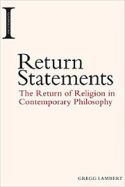
(2016 U.K & North America) Return Statements: The Return of Religion in Contemporary Philosophy, Edition: 1. Edinburgh University Press. "Incitements," edited by Peg Birmingham and Dimitris Vardoulakis.
This original study, compiled from talks and essays written in the first decade of the new millennium, examines two facets of the return to religion in the 21st century: the resurgence of overtly religious themes in contemporary philosophy and the global ‘post-secular’ turn that has been taking place since 9/11. He asks how these two ‘returns to religion’ can be taking place simultaneously, and explores the relationship between them. Lambert reflects on statements of these returns from contemporary philosophers including Alain Badiou, John D. Caputo, Jacques Derrida and Jean-Luc Nancy. He discovers a unique – and foreboding – sense of the term ‘religion’ that belongs exclusively to our contemporary perspective.
Gregg Lambert offers us here a fascinating series of responses—at once philosophically astute, politically and historically well-informed, and often sharply satirical—to the so-called "post-secular turn" in contemporary continental thought and its renewed interest, whether for good or ill, in questions of religion, faith, community, love, and life.--DePaul University, Michael Naas
Neither dismissively condescending nor unthinkingly reverent, Lambert's Return Statements is a stunning exploration of the return of religion in theory, philosophy and contemporary culture. The critical range of this book is remarkable; from Derrida to Zizek, Lambert provides a stylish and intelligent exploration of the various deployments of spirit for our 'post-secular' present.--Penn State University, Claire Colebrook
Lambert’s claim that if an adequate reflective schema cannot simply follow from bracketing the subject or the “anthropomorphic frame” it is because our difficulty in coherently conceiving the world and its objects does not originate in the subject, but “the errors of Life itself ” (221). Foucault thereby makes what Lambert considers his most striking claim: that philosophy can be understood as a discontinuous series of “corrections” to the radical capacity of life to “err.” Thus, Lambert’s proposal of an adequate philosophical perspectivism is meant to be up to the task of a new “return address”: what, according to Foucault, would constitute a philosophical program within an itinerary of errors and chance, which “should be incorporated into the history of truth” so that “the entire theory of the subject would have to be reformulated once knowledge . . . is rooted in the ‘errors of life’”—Jason Tuckwell (Philosophy Today)
Return Statements is a book that makes for strange—estranging—company. Like Derrida, Badiou, Nancy, and others, Lambert is hardly “with” religion, but neither is he overtly “against” it—or “with” or “against” these other theorists. What he shares with Nancy—again, perhaps paradoxically: a recurring motif in Lambert’s radically skeptical program—is a desire for “communication without the threat of communion, outside any common identity, or danger of fusional interiority. . . . [P]erhaps the highest task of [Nancy’s] philosophy,” and of Lambert’s, as well, is “to expose every living community to this limit, thereby making it unworkable; to de-mythologize all presumptions of community based on the presence of a ‘common being.’”21 That is, Lambert is less invested in making the case for a particular school of thought than in exploring the “limit[s]” of such schools (such communities, tribes, and creeds), the conditions of possibility that make them possible.—Matthew Wickman (Philosophy Today)
Published Reviews:
Colby Dickinson, review of Return Statements: Return of Religion in Contemporary Philosophy, NDPR, fall 2016.
David Newheiser, “A Response to Gregg Lambert, Return Statements” Philosophy Today, vol. 62, issue 4 (Fall 2018): 1277-1282.
Jason Tuckwell, “Radical Skepsis and Perspectivism: On Return Statements,” Philosophy Today, vol. 62, issue 4 (Fall 2018): 1283-1292.
Matthew Wickman, “Why Return to the “Return to Religion”? Philosophy Today, vol. 62, issue 4 (Fall 2018): 1293-1302.
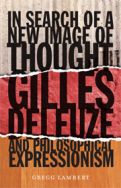
(2012, U.S. & North America) In Search of a New Image of Thought: Gilles Deleuze and Philosophical Expressionism, Minneapolis: University of Minnesota Press.
As early as Difference and Repetition (1968), Deleuze argued ‘a search for a new means of philosophical expression … must be pursued today in relation to the renewal of certain other arts, such as theatre or contemporary cinema.’ This study demonstrates how the search for a new means of philosophical expression becomes a central concern of all the works that follow, including the works conceived and written with psychoanalyst Félix Guattari, and concluding with their last work conceived (if not actually written) together,What is Philosophy? (1991). It provides a brief, yet systematic, overview of this search for a new means of philosophical expression, with special emphasis on the role played by modern literature (or what Deleuze and Guattari will call ‘literary machines’) and by certain modern writers in particular (namely, Proust, Kafka, Kleist, and Melville) in forging a new means of philosophical expression in their own works, including their monumental work of ‘anti-philosophy,’ A Thousand Plateaus.
Gregg Lambert has been something of a star in the expanding scholarship that surrounds the work of Gilles Deleuze, a magnesium flare in the night of interpretation. Lambert’s previous books and essays include The Non-Philosophy of Gilles Deleuze (2003) and The Return of the Baroque in Modern Culture (2005), both of which stood out for their clarity of thought and expression. Here Lambert uses his concise skills to read a continuity in the enigmatic French philosopher’s oeuvre, this continuity being the search for an image of thought. Lambert turns to Deleuze’s work on literature and cinema as a way of describing this continuity, that first appears in his 1964 work Proust et les Signes, marking the moment at which a young philosopher begins to look outward beyond the history of ideas taught in the French education system. Deleuze’s innovation here is to turn to literature for inspiration, rather than to philosophy, although as Lambert points out, he is no more or less radical than his contemporaries in 1960s France. The difference between Deleuze and his fellow poststructuralists lies in the way that he anticipated a new beginning, rather than marking an end of the philosophical tradition. It is not so much that Deleuze is their idiosyncratic cousin as a sibling who presumes the end of philosophy has already taken place.--Darren Jorgensen, Symploke (v. 21, no. 1-2, 2013)
In Search of a New Image of Thought is an important and exciting study. As Gregg Lambert points out, the notion of the ‘image of thought’ is of crucial importance in Deleuze’s conception of philosophy; Lambert’s approach to the concept via literary examples is ingenious, and as he builds his argument, the viability of that approach becomes increasingly persuasive. Lambert’s readings of Deleuze’s works are penetrating. —Ronald Bogue, University of Georgia
Published Reviews:
Darren Jorgensen, “In Search of a New Image of Thought: Gilles Deleuze and Philsophical Expressionism, Symploke, Volume 21, Numbers 1-2, 2013, pp. 403-404 (Review Article)
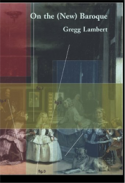
(2008 U.S. & North America) On the (New) Baroque, vol. 12 in "Critical Studies in the Humanities," The Davies Group, 226 pgs w/appendices & index
A new revised & expanded North-American paperback edition of The Return of the Baroque in Modern Culture [Continuum Books, 2004] with 2008 forward, coda, and appendix, “On the Baroque Detective” from The Non-Philosophy of Gilles Deleuze [2002]).
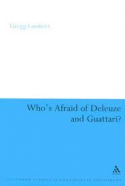
(2006 U.K. & 2008 U.S.[pb]) Who’s Afraid of Deleuze and Guattari? London and New York: Continuum International Publishing Group. 180 pgs. Korean edition translated by Choi, Seokjin (Seoul: Jaeum & Moeum, 2013).
Deleuze and Guattari's landmark philosophical project, Capitalism and Schizophrenia, has been hailed as a 'highly original and sensational' major philosophical work. The collaboration of two of the most remarkable and influential minds of the twentieth century, it is a project that still sets the terms of contemporary philosophical debate. It provides a radical and compelling analysis of social and cultural phenomena, offering fresh alternatives for thinking about history, society, capitalism and culture. In Who's Afraid of Deleuze and Guattari?, Gregg Lambert revisits this seminal work and re-evaluates Deleuze and Guattari's legacy in philosophy, literary criticism and cultural studies since the early 1980s. Lambert offers the first detailed analysis of the reception of the Capitalism and Schizophrenia project by such key figures as Jameson, Zizek, Badiou, Hardt, Negri and Agamben. He argues that the project has suffered from being underappreciated and too hastily dismissed on the one hand and, on the other, too quickly assimilated to the objectives of other desires such as multiculturalism or American identity politics. In the light of the limitations of this reception-history, Lambert offers a fresh evaluation of the project and its influences that promise to challenge the ways in which Deleuze and Guattari's controversial and remarkable project has been received. Divided into four key sections, Aesthetics, Psychoanalysis, Politics and Power, Who's Afraid of Deleuze and Guattari? offers a fresh, witty and intelligent analysis of this major philosophical project.
‘Gregg Lambert has written a quite excellent book on Deleuze and Guattari. It provides a series of fascinating and highly instructive insights into their critical engagement with Marxism and psychoanalysis and shows the continuing relevance of their critique. Along the way Lambert offers valuable insights into Deleuze's relation to figures such as Heidegger and Whitehead and indicates the importance of Deleuze's early essay on instincts and institutions for a full appreciation of his remarkable intellectual trajectory. The sprightliness of the book is testimony to the fact that Deleuze is the most original and innovative philosopher of our times, a thinker who sought to be equal to philosophical events. One can only applaud Lambert's effort to be equal to Deleuze's event.' --Keith Ansell-Pearson, Professor of Philsophy, University of Warwick
'Polemical, erudite and incisive, Gregg Lambert's latest book provides a major re-evaluation of the significance of Deleuze and Guattari's work for literature, psychoanalysis and politics. Lambert engages Jameson, Zizek, Hardt and Negri with an intimate understanding of Deleuze and Guattari's concepts. This is a fine piece of work.'--Phillip Goodchild, Nottingham University, UK.
Published Reviews:
Henry Somers-Hall. "Who's Afraid of Deleuze and Guattari? (review)." French Studies: A Quarterly Review 66.3 (2012): 425-425.
Aidan Tynan, review of Who’s Afraid of Deleuze & Guattari? Symploke 16: 1-2 (2009), 329-331.
Marius Constanintou and Maria Margaroni, review of Who’s Afraid of Deleuze and Guattari? This Year’s Work in Critical and Cultural Theory, Vol. 16 (Oxford, June 2008).
Claire Colebrook, review of Who’s Afraid of Deleuze and Guattari? Notre Dame Philosophical Review, 2008.03.13
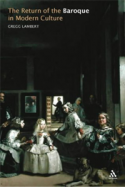
(2004 U.K. & 2005 U.S.) The Return of the Baroque in Modern Culture, London and New York: Continuum International Publishing Group. 192 pgs.
The Return of the Baroque in Modern Culture explores the re-invention of the early European Baroque within the philosophical, cultural, and literary thought of postmodernism in Europe, the United States, the Caribbean, and Latin America. Gregg Lambert argues that the “return of the Baroque” expresses a principle often hidden behind the cultural logic of postmodernism in its various national and cultural incarnations, a principal often in variance with Anglo-American modernism. Writers and theorists examined include Walter Benjamin, Paul de Man, Jacques Derrida, Michel Foucault, Octavio Paz, and Cuban novelists Alejo Carpentier and Severo Sarduy. A highly original and compelling reinterpretation of modernity, The Return of the Baroque in Modern Culture answers Raymond Williams’ charge to create alternative national and international accounts of aesthetic and cultural history in order to challenge the centrality of Anglo-American modernism.
Published Reviews:
Eric S. Rorabach, review of Return of the Baroque in EREA: Revue d’etudes anglophone (Vol. 3:2, Fall 2005).
Philip Derbyshire, review of Return of the Baroque, in Radical Philosophy (summer 2005).
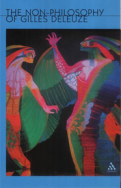
(2002 U.K. & 2003 U.S.) The Non-Philosophy of Gilles Deleuze, London and New York: Continuum International Publishing Group. 182 pgs.
The Non-Philosophy of Gilles Deleuze takes up Deleuze's most powerful argument on the task of contemporary philosophy in the West. Deleuze argues that it is only through a creative engagement with the forms of non-philosophy--notably modern art, literature and cinema--that philosophy can hope to attain the conceptual resources to restore the broken links of perception, language and emotion. In short, this is the only future for philosophy if it is to repair its fragile relationship to immanence to the world as it is.A sequence of dazzling essays analyze Deleuze's investigations into the modern arts. Particular attention is paid to Deleuze's exploration of Liebniz in relation to modern painting and of Borges to an understanding of the relationship between philosophy, literature and language. By illustrating Deleuze's own approach to the arts, and to modern literature in particular, the book demonstrates the critical significance of Deleuze's call for a future philosophy defined as an "art of inventing concepts."
"…It is the most detailed and extensive investigation of the non-philosophy of Deleuze to have been published in English to date…Lambert largely forgoes a didactic approach, opting instead for a more embodied account of the relation between philosophy and 'non-philosophy' that draws on a variety of different media—architecture, painting, literature, film and theater—to illustrate the indebtedness of Deleuze's philosophical oeuvre to such non-philosophical modes of creative and artistic practice…Lambert sets out some of the implications of the aforementioned crises: the problem of judgment in an age that has witnessed the overturning of rationalist principles regarding the ordering of the world…one of the remarkable achievements of The Non-Philosophy of Gilles Deleuze is the way in which, contra many other commentaries on Deleuze, it remains faithful to the pragmatism of Deleuze's work in a way that actually develops and deepens this dimension of the latter's thinking, never losing sight of the initial point of departure: the crisis of the Baroque and what it can teach us about the crisis of our contemporary age…Nevertheless, Non-Philosophy of Gilles Deleuze contributes substantially to the current debates around the political and ethical status of his work (brought so profoundly into relief by Badiou) and, hopefully, it will inspire others to start taking his work along new lines and trajectories without losing sight of the impasses and shortcomings that continue to affect the reception of Deleuze's work in the English speaking world." —Marcel Swiboda, Year's Work in Critical and Cultural Theory, Vol. 12
Published Reviews:
Matthew Hyland. Review of The Non-Philosophy of Gilles Deleuze (Continuum 2002), Mute, issue 25, May 2003, pp. 120-122.
Mary Bryden. Review of The Non-Philosophy of Gilles Deleuze (Continuum 2002), New Formations, issue 49, May 2003.
Alan Nicholson. Review of The Non-Philosophy of Gilles Deleuze (Continuum 2002), Textual Practice (17)2, 2003.
Damian Sutton. Review of The Non-Philosophy of Gilles Deleuze (Continuum 2002), Centre for Visual Culture in Britain (Journal), Vol. 5/1, 2004.
Marcel Swiboda, “Immanence” (review of Non-Philosophy of Gilles Deleuze), This Year’s Work in Cultural and Critical Theory, Vol. 14 (Oxford, June 2005).
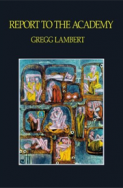
(2001 U.S. & North America) Report to the Academy (re: The New Conflict of Faculties), vol. 7 in “The Critical Studies in the Humanities,” The Davies Group, 209 pgs.
Report to the Academy addresses the signs of the perceived crisis of the first-world university as the result of its take-over by a new model of administrative rationality. Rather than seeing this as an entirely new development, Professor Lambert reveals the striking similarities between the present day conflict over the idea of the university as a social and cultural institution, and the conflict over reason first outlined by the 18th century philosopher Immanuel Kant. Taking up the original argument of Kant’s The Conflict of the Faculties, as well as more recent arguments by philosophers and cultural critics such as Jacques Derrida, Jean-Francois Lyotard, Jurgen Habermas, Fredric Jameson, and Bill Readings, Report to the Academy offers a lively and compelling interpretation of the most critical issues underlying the contemporary debates over the fate of higher education. Lambert concludes his "report" by framing these issues in terms of two guiding questions, which he addresses to faculty and administrators alike: "What should count as "critical" social and cultural knowledge?" and "Who should have the authority to decide?" These questions, Lambert argues, return us to the very heart of the university’s mission for the larger society, and should become the occasion of "a new conflict of the faculties."
"Report to the Academy is a major reflection on the state of the university today, especially on the vexed question of the role of the humanities in the new transnational and corporation-dominated university now coming into being. Anyone teaching humanities today will be aware of the changes that are taking place with unprecedented rapidity, but it is not all that easy to reflect with objectivity on just what those changes are or to explain them. Lambert's book does a superb job of accomplishing that, through careful readings of work by Kant, Lyotard, Derrida, Jameson, Habermas, Luhman, and Readings. Of special importance is his recognition of one important factor not made salient in earlier work. The university library used to be the major repository and data-base for the accumulated learning of our culture. You have to have proper credentials to have access to that data-base. Now the Internet is replacing the library as a kind of universal data-base, and one major function of the university is fading. You don't need to be in the university to have access to more and more material, for example the illuminated manuscript books of William Blake, once available only to a few specialists. Among many other astute insights, Lambert's book recognizes what a major change this is in the social role of the university.--J. Hillis Miller, UCI Distinguished Professor of English and Comparative Literature, University of California, Irvine.
“Professor Lambert’s Report to the Academy is at once the work of a ‘public intellectual’ concerned about the institutional and intellectual future of the humanities, and the work of a fine literary scholar commenting upon recent discussions of these issues by Lyotard, Derrida, Readings and others. On both counts it is an outstanding contribution to an important debate” -- Paul Patton, University of Sydney"In the wake of the culture wars, the academic job crisis, the drive for corporate sponsorship, and the increasingly prominent place of college sports, the contemporary American university, perhaps our most vital public institution seems to have lost its bearings. Gregg Lambert’s Report to the Academy takes a timely step back from all the brouhaha to conduct an analysis of the philosophical grounds of the university, from Kant to Derrida, Lyotard, and Readings. Gregg Lambert’s Report to the Academy is an important statement advocating the "postcritical" university, one that productively questions both current disciplinary and administrative logic.-- Jeffrey J. Williams, University of Missouri at Columbia, editor of the minnesota review.